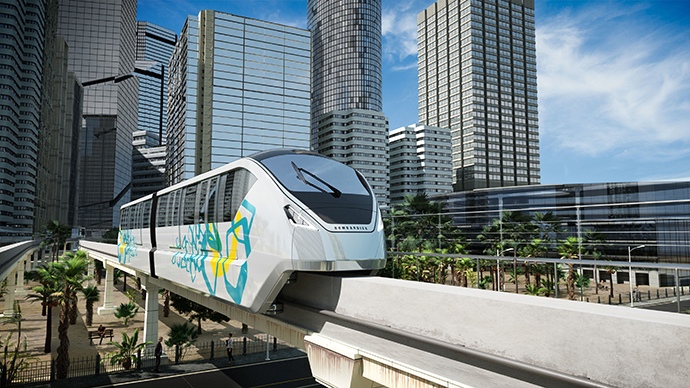Bombardier Transportation announced in October that Bangkok Mass Transit System Public Co. Ltd. (BTSC) had signed a $287-million contract earlier in the year for 20 years of maintenance services for the company’s INNOVIA monorail 300 systems scheduled to be put in place on Thailand’s first two monorail lines: the Bangkok pink and yellow lines.
"We are very pleased to continue our over-a-decade-long partnership with BTSC and to continue to contribute to aBangkok’s urban development," said Gregory Enjalbert, managing director Thailand for Bombardier Transportation. The project, however, was just one among many pieces of Bombardier business in the Asia Pacific that simultaneously boost company growth while also boosting regional "smart city" economic development.
Since 1997, Bombardier Transportation (a Berlin-based business unit of the Quebec company) has expanded its Bangkok team to over 620 engineers and employees, "providing full life-cycle rail system support for customers across Asia Pacific," says the company. In December, as the leader in a consortium, Bombardier delivered the turnkey wayside rail system that is operating on the latest extension to Bangkok’s rapid transit Skytrain. The new 13-km. (8-mile) Bearing-Samut Prakam section of the Sukhumvit Line is expected to enable up to 100,000 more journeys on the Skytrain, which regularly carries over 750,000 passengers per day. "It is exciting to witness the opening of a new rail link that is extending connectivity to new parts of the Thai capital and will significantly improve the travel experience for commuters," said Enjalbert when the line was inaugurated by Thailand Prime Minister Prayut Chan-o-cha at a special event also attended by Canadian Ambassador to Thailand Donica Pottie.
Singapore Service, Malaysian Talent
In November, Bombardier Transportation and ST Engineering’s Land Systems arm announced a new strategic partnership to build a Singapore Service Center that will combine their respective strengths in transportation design; manufacturing; engineering knowledge; and maintenance, repair and overhaul (MRO) expertise to drive cost-effective localized component repair capabilities for customers in Singapore, as well as regionally.
Over the past 20 years, Bombardier has delivered 276 driverless MOVIA metro cars for Singapore’s Downtown Line and 13 INNOVIA APM 100 automated people mover cars for the Bukit Panjang Light Rail Transit (LRT) system. Earlier this year, a new asset replacement contract was awarded to supply 19 new INNOVIA APM 300 cars, to retrofit 13 existing APM 100 cars, as well as to deliver a signaling system upgrade for 13 stops on the Bukit Panjang LRT Line.
A new $607-million contract was awarded in July 2018 to supply 396 MOVIA metro cars for the high-capacity North-South (NSL) and East-West (EWL) Mass Rapid Transit (MRT) lines. Combined, the two lines total 102 km. (63 miles) in length and serve 61 stations, with an average daily combined ridership of more than 1.8 million. The new order brings the number of MOVIA vehicles in Singapore to 672 — one of Bombardier’s largest metro fleets in the world.
“In China, high-speed trains have changed people’s life dramatically.”
In September, Bombardier Transportation signed an MOU with the Malaysian Industry Government Group for High Technology (MIGHT) outlining their collaboration on developing home-grown rail industry expertise. The company has been actively implementing a graduate program over the last two years along with university associations to prepare young talent as well as expand their capabilities in the rail industry, driven in part by a Rail Industry Development Blueprint developed by MIGHT in 2012.
"With several significant collaboration milestones in Thailand, Singapore and Malaysia focused on to developing local talent over the past four years, we believe these initiatives will drive productivity, increase performance and improve competitiveness — ultimately raising rail industry performance regionally as well as globally," said Jayaram Naidu, vice president of Southeast Asia for Bombardier Transportation. Bombardier’s presence in Malaysia began in 1992 as lead supplier for the 27-km. Kuala Lumpur Sri Petaling and Ampang Line. Since then, several Bombardier transit systems have been delivered for the Kuala Lumpur International Airport and the Kelana Jaya LRT, linking the western and eastern suburbs with Kuala Lumpur’s downtown core. In 2017, the Kelana Jaya LRT network became the city’s busiest line, moving up to 255,000 passengers daily.
China Juggernaut
As with many endeavors, other countries’ rail investments pale in comparison to the scale found in China. In October, the latest $324-million contract awarded to Chinese joint venture Bombardier Sifang (Qingdao) Transportation Ltd. (BST) by China Railway Corp. (CRC) was for 120 CR400AF new high-speed train cars for China’s evolving high-speed rail network, where cars operate at 350 kmh (217 mph).
"In China, high-speed trains have changed people’s life dramatically," said Jianwei Zhang, president of Bombardier Transportation China, noting that they help to "close the distance between villages and cities," bridge the gaps between rural and urban, and speed up economic growth.
BST in early December celebrated the 20th anniversary of its factory. A few days later, another order came from CRC for 168 more high-speed train cars. Bombardier Transportation in China has six joint ventures, seven wholly foreign-owned enterprises, and more than 7,000 employees who altogether have delivered more than 4,000 railway passenger cars, 580 electric locomotives and over 2,500 metro cars, Monorail, APM (Automated People Mover), and trams to China’s growing urban mass transit markets.

